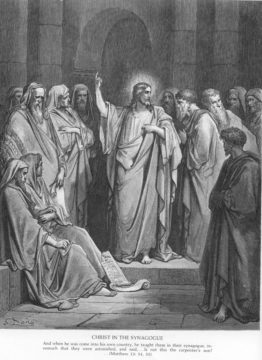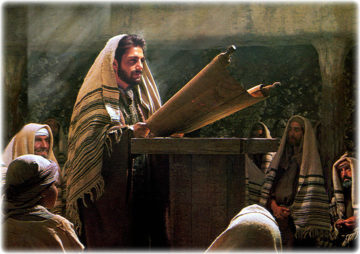As we anticipate the Fourteenth Sunday of Ordinary Time 2021, Fr. Paul Gallagher, OFM offers a Scriptural Reflection. This content is edited by Franciscan Sister of Christian Charity Sister Anne Marie Lom and Joe Thiel. The excerpts from the Sunday readings are prepared by Joe Thiel. To read or download the complete pdf with excerpts for your prayer, please click here: Franciscan Gospel Reflection July 4 2021 . Excerpts are from the Lectionary for Mass for Use in the Dioceses of the United States of America, second typical edition © 2001, 1998, 1997, 1986, 1970 Confraternity of Christian Doctrine, Inc., Washington, DC. Used with permission. All rights reserved. No portion of this text may be reproduced by any means without permission in writing from the copyright owner. Image: The Doré Bible Gallery Woodcuts by Gustave Doré (1832-1883) Matt13a.jpg (750×1032) “http://catholic-resources.org jesus-teaches-in-the-synagogue.jpg (906×640) (jimmyakin.com)
Mark 6:1-6
Jesus departed from there and came to his native place, accompanied by his disciples. When the Sabbath came he began to teach in the synagogue, and many who heard him were astonished. They said, “Where did this man get all this? What kind of wisdom has been given him? What mighty deeds are wrought by his hands! Is he not the carpenter, the son of Mary, and the brother of James and Joses and Judas and Simon? And are not his sisters here with us?” And they took offense at him.
Jesus said to them, “A prophet is not without honor except in his native place and among his own kin and in his own house.” So he was not able to perform any mighty deed there, apart from curing a few sick people by laying his hands on them. He was amazed at their lack of faith. He went around to the villages in the vicinity teaching.
Background:
The text for this Sunday’s gospel follows directly from last week’s gospel text. The response of the people to Jesus’ presence is dramatically different. The faith of both Jairus and the woman who had been hemorrhaging in last week’s gospel was inspiring. But here, the response of people of Nazareth, Jesus’ own kin, is debilitating. They do not take offense in Jesus’ teaching. Mark states clearly in verse 2, “many who heard him were astonished.” Rather, they reject Jesus because he is not acting as the son of a carpenter.
People in this period believed each person held a certain status that had been entrusted to them, and they were responsible to maintain that status. To try to rise above that status was a disruption of the social structures. A major factor in determining a person’s status in the community was the family into which they were born. Sons were expected to carry on the trade and business of their father. Jesus was expected to be a carpenter like his father.
Mark signals the people of Nazareth’s displeasure with Jesus by referring to him as the son of Mary. Nazareth is the town of Joseph. Usually, people were designated as sons of their father. James and John are known as the sons of Zebedee. When a person is referred to as a son of their mother, it usually is because the father is uncertain. Mark’s community would have understood the reference to Jesus being the son of Mary as a derogatory statement.
Jesus is often portrayed as the master of insult. Here, Mark portrays Jesus as being ready with his own insult. Drawing on their sacred tradition, he quotes a familiar proverb to criticize those who are critical of him by casting them in same light as those in their familiar proverb.
 Most of us realize that there is a great deal of Jesus’ public life for which we have no record. Mark, like all the gospel writers, had to select what events in the life of Jesus would be included in his gospel. Why would Mark include a text that is not flattering to the people of Jesus’ hometown? Why would he suggest, in some way, that Jesus was negatively affected by the townspeople’s reaction to him? This text could be problematic for Christian missionaries who are trying to convince people that Jesus was the Messiah. Would the Messiah be flustered by a negative reaction to his message? Could the early Christians find in the Jesus who is criticized and rejected by his own family, a Jesus that they could relate to and be the Christ?
Most of us realize that there is a great deal of Jesus’ public life for which we have no record. Mark, like all the gospel writers, had to select what events in the life of Jesus would be included in his gospel. Why would Mark include a text that is not flattering to the people of Jesus’ hometown? Why would he suggest, in some way, that Jesus was negatively affected by the townspeople’s reaction to him? This text could be problematic for Christian missionaries who are trying to convince people that Jesus was the Messiah. Would the Messiah be flustered by a negative reaction to his message? Could the early Christians find in the Jesus who is criticized and rejected by his own family, a Jesus that they could relate to and be the Christ?
Reflection Questions:
- Did you go through a period of life when you were uncertain about what you were to do or how you wanted to live your life?
- Who are the people who have been most supportive of you as you found your own way in life?
- Who were the people who had the most difficulty in supporting you during this searching period of your life?
- Have you ever reflected on the fact that Jesus too might have gone through such a period in his own life?
- Is it significant for you personally that Jesus was criticized by his family and neighbors because he did not meet their expectations?
- What do you make of the statement that Jesus was affected by the negativity of his family and neighbors?
- Can you take some time to talk with God about your experience of rejection, not being able to fulfill the expectations of others, or whatever struck you most strongly in this gospel?



